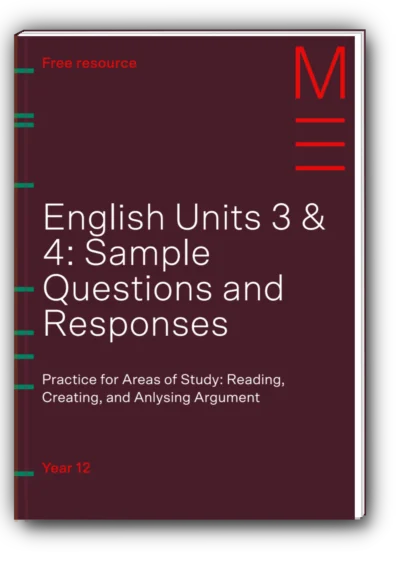Welcome to Matrix Education
To ensure we are showing you the most relevant content, please select your location below.
Select a year to see courses
Learn online or on-campus during the term or school holidays
Learn online or on-campus during the term or school holidays
Learn online or on-campus during the term or school holidays
Learn online or on-campus during the term or school holidays
Learn online or on-campus during the term or school holidays
Learn online or on-campus during the term or school holidays
Learn online or on-campus during the term or school holidays
Learn online or on-campus during the term or school holidays
Learn online or on-campus during the term or school holidays
Learn online or on-campus during the term or school holidays
Select a year to see available courses
Science guides to help you get ahead
Science guides to help you get ahead
Ace Year 12 English by checking out this clear guide to VCE English Units 3 & 4. Use this to build your skills and get ahead early!

Join 75,893 students who already have a head start.
"*" indicates required fields
You might also like
Related courses

Join 8000+ students each term who already have a head start on their school academic journey.
VCE English Units 3 & 4 are the big ones—your final school assessments and the end-of-year exam each count for 50% of your study score. That means now’s the time to sharpen your skills and write with confidence.
In this guide, you’ll get a break down of each Area of Study, the key skills you need to master, and top-scoring responses to learn from.
Let’s get into it.
In part 1 of this guide, we’ll walk you through:
VCE writing strategies with expert teachers
Learn from expert VCE teachers and resources. 84% of Matrix students score a 90+ ATAR. Book your free trial.
The Year 12 English Study Design is broken down into four parts:
| Unit | Area of Study | Title | Overview |
| 3 | 1 | Reading and Responding to Texts | Close study of one set text (chosen from a VCAA list). Focus on critical engagement, analysis and essay writing. |
| 3 | 2 | Creating Texts | Creative writing for imaginative, persuasive and informative purposes. Influenced by the careful study of three or more ‘mentor texts’ (chosen from a VCAA list). |
| 4 | 1 | Reading and Responding to Texts | Deepening the inferential reading skills from Unit 3, focusing on a different set text (chosen from the same VCAA list). |
| 4 | 2 | Analysing Argument | Studying persuasive writing and presenting skills, and delivering an ‘oral point of view presentation’ on a contemporary topic of local or national importance. Respond critically to arguments published in a variety of forms, modes and media. |
Each of these parts is linked to a specific set of key skills that you need to master.
| Key Skill | Explanation |
| Apply reading and viewing strategies | Read the text with purpose. Think about who it’s for, why it was written, and what techniques it uses. |
| Read and engage for meaning | Texts can contain many layers of meaning – literal, symbolic, metaphorical, and implied. Texts may even seem contradictory or meaningless. Think about different characters’ views and how they shape the story. |
| Discuss to test your ideas about a text | Make hypotheses about the text, then test those ideas by discussing them with the class. Be prepared to receive and give critiques. This helps you refine your understanding. |
| Use metalanguage | “Metalanguage” means “technical language used to discuss language itself”. E.g. technical terms like “form”, “metaphor”, “narrator” and “metre”. |
| Analyse subtextual information | Why do characters behave a certain way? Look at their motivations, relationship tensions, setting, themes, and values. Look at the writer’s influences (historical, cultural and social values with which the text endorses OR critiques). |
| Analyse language and structure | Always support your claims with direct (but short) quotes from the text. Notice how word choice, structure (like chapters or scenes), and language techniques (like metaphor or repetition) influence meaning. |
| Write clear, well-structured responses | Answer the question clearly and stick to your argument. Support each point with evidence, and make sure everything ties back to your main message. |
| Engage with spoken and audiovisual texts | Watch or listen to talks, podcasts or videos about your text. Take notes, focus on key points, and use this info to strengthen your analysis. |

| Key Skill | Explanation |
| Study mentor texts to see what makes effective and cohesive writing | You’ll study 3 mentor texts, all relating to one of the ‘Framework of Ideas’. Look at how word choice, structure, and style create a strong, “cohesive” overall effect. |
| Experiment with language and structure | Emphasis on experimentation. Try new and original ways of writing. Just make sure all parts of your writing work together and make sense as a whole. |
| Write with purpose and audience in mind | Before writing, know who you’re writing for and what message or feeling you want to leave them with. |
| Follow a writing process | Be systematic: Plan your writing, draft it, then revise it. Use the right structure for the task. Don’t write a story if it’s meant to be an essay. Be prepared to revisit earlier drafts of your work. |
| Generate ideas, discuss and develop these ideas | Start with an original idea and take it further. Show that you’ve thought deeply about it. |
| Choose the right voice and style | How will you address your reader? Use a voice and tone that fits your purpose and audience. Decide on the point of view and tense before you start writing. |
| Experiment with vocabulary | Avoid cliches by finding new and innovative ways to express yourself. |
| Give and receive feedback | Talk with your classmates and teacher about your writing. Learn how to give and apply useful feedback. |
| Explain your writing choices: Vocabulary, text structures. Language features and conventions | Be able to describe why you used certain words, structures or techniques in your writing. For each technique you identify, consider its effect on the reader and how it would be changed if that technique had not been used. |
| Apply standard and non-standard conventions of language | Standard Australian English involves ‘correct’ spelling, punctuation and grammar. Non-standard forms might include dialect, sociolect and some forms of poetic expression (e.g. not using punctuation marks). |
Download our free sample questions and exemplar responses for VCE English Units 3 & 4 and get confident with your assessments!

Get sample questions and answers for Units 3 & 4: Reading Texts, Creating Texts, and Analysing Arguments.

Fill out your details below to get this resource emailed to you.
"*" indicates required fields
Written by Matrix English Team
The Matrix English Team are tutors and teachers with a passion for English and writing, and a dedication to seeing Matrix Students achieving their academic goals.© Matrix Education and www.matrix.edu.au, 2025. Unauthorised use and/or duplication of this material without express and written permission from this site’s author and/or owner is strictly prohibited. Excerpts and links may be used, provided that full and clear credit is given to Matrix Education and www.matrix.edu.au with appropriate and specific direction to the original content.